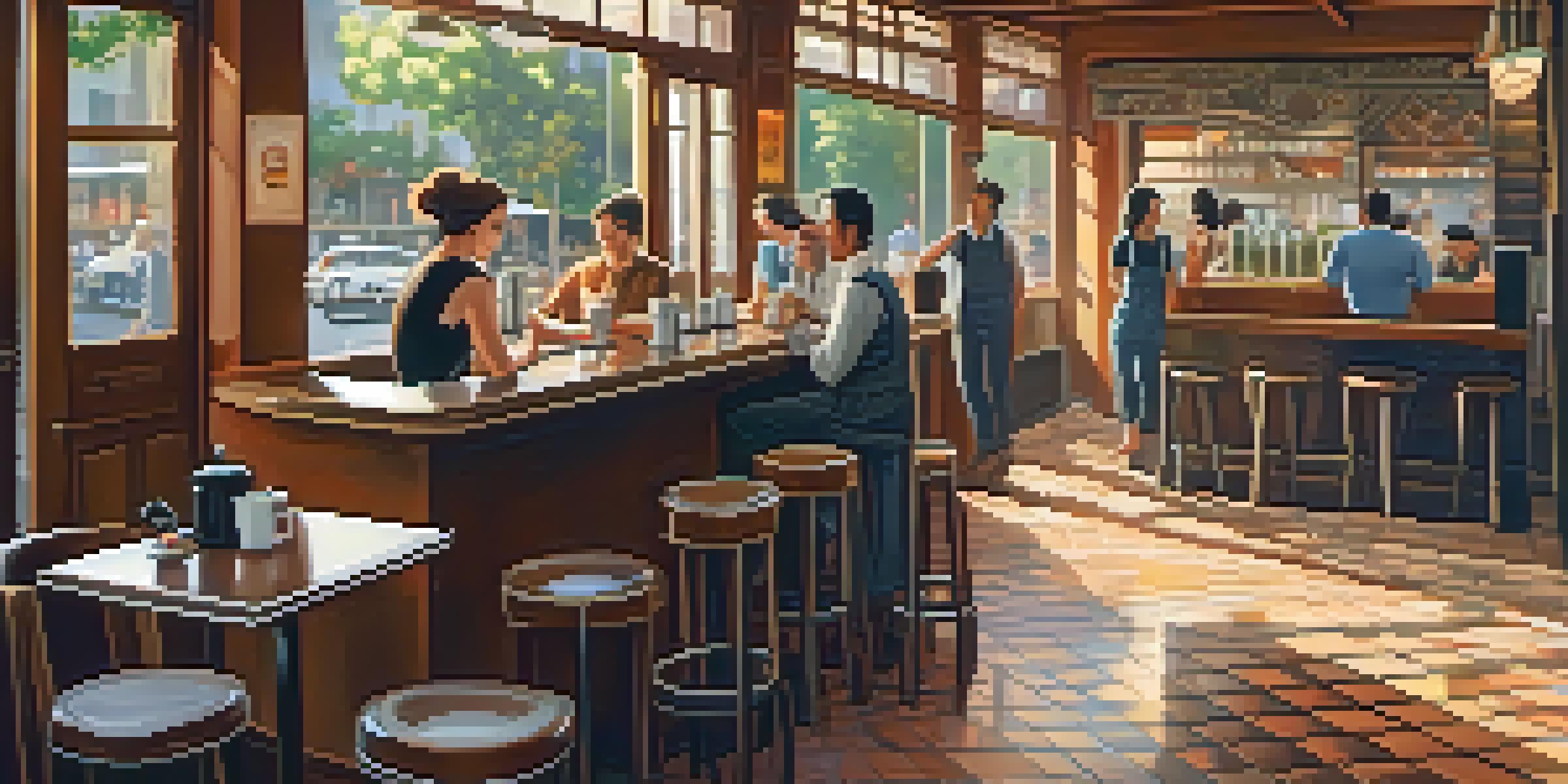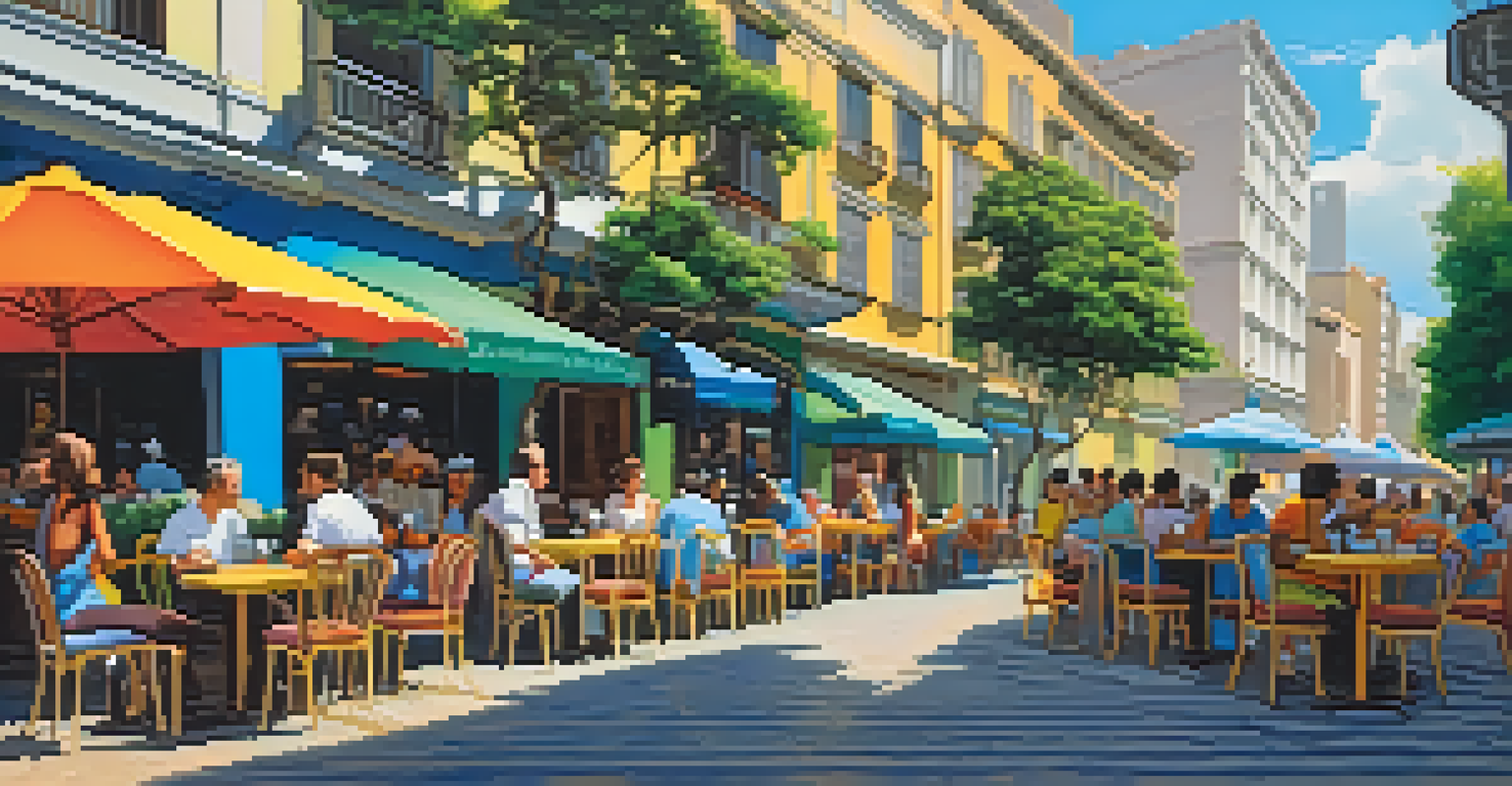São Paulo's Historic Coffee Shops: A Taste of the Past

The Coffee Culture of São Paulo: An Overview
São Paulo’s coffee culture is rich and deeply rooted in its history, dating back to the 18th century. The city became a hub for coffee production, attracting immigrants and fostering a vibrant café scene. Today, these establishments are more than just places to grab a cup; they are cultural landmarks that reflect the city's evolution.
Coffee is a language in itself.
Visiting a coffee shop in São Paulo is like stepping into a living museum, where each sip tells a story of the past. The atmosphere often blends nostalgia with modernity, making it a perfect spot for both locals and tourists. It's not just about coffee; it's about experiencing a slice of São Paulo's heritage.
From the elegance of classic establishments to the warmth of family-owned cafés, each venue offers a unique perspective on the city’s coffee journey. As we explore these historic coffee shops, we'll uncover the flavors and stories that have shaped São Paulo’s identity.
Café do Ponto: A Timeless Classic
Café do Ponto is one of the most iconic coffee shops in São Paulo, known for its rich history and traditional brewing methods. Established in the early 20th century, it has become a beloved spot for coffee enthusiasts. The aroma of freshly ground beans wafts through the air, inviting visitors to indulge in its offerings.

This café is famed for its ‘café com leite,’ a perfect blend of coffee and milk that has been enjoyed by generations. The ambiance is warm and inviting, with vintage décor that echoes the café's long-standing legacy. It’s a place where you can sit back, relax, and soak in the rich history of São Paulo’s coffee culture.
São Paulo's Rich Coffee Heritage
The coffee culture in São Paulo is deeply rooted in history, featuring diverse cafes that reflect the city's evolution and serve as cultural landmarks.
At Café do Ponto, the baristas are passionate about their craft, often engaging with customers to share tips or stories about the coffee. This personal touch enhances the experience, making each visit memorable. Whether you’re a coffee connoisseur or a casual drinker, Café do Ponto offers a taste of history with every cup.
Café Girondino: A Historical Gem
Nestled in the heart of São Paulo, Café Girondino is another historical gem that has stood the test of time. Established in the 1930s, it features art deco architecture and a charming interior that transports visitors back in time. The café has a rich history, having served as a meeting place for intellectuals and artists over the decades.
The mere chattering of the coffee shop is a reminder of the life outside, even when you are alone.
The menu at Café Girondino boasts traditional Brazilian coffee, paired with delicious pastries that are perfect for a mid-afternoon break. The staff is knowledgeable and eager to share stories about the café’s heritage, adding depth to your coffee experience. It’s a place where each cup is steeped in history and passion.
Many patrons come for the ambiance as much as the coffee, often lingering over their drinks to enjoy the décor and the vibe. Whether you're catching up with friends or diving into a good book, Café Girondino provides a cozy backdrop for a relaxing escape. It’s a perfect representation of how coffee shops can serve as cultural hubs in a bustling city.
Café Floresta: Where Tradition Meets Modernity
Café Floresta is a unique blend of traditional Brazilian coffee culture and modern café trends. Opened in the late 19th century, it has evolved while maintaining its commitment to high-quality coffee. The shop’s décor reflects its history, featuring vintage furniture alongside contemporary art that appeals to a younger crowd.
This café is particularly known for its artisanal brews, which highlight the rich flavors of Brazilian coffee beans. The baristas here take pride in their craft, often experimenting with new brewing techniques to delight their customers. It’s a place where you can taste the innovation while honoring the past.
Cafés as Social Hubs
Coffee shops in São Paulo act as vital social spaces, fostering community connections and vibrant conversations among locals and visitors alike.
The lively atmosphere at Café Floresta makes it a popular spot for both work and socializing. With free Wi-Fi and comfortable seating, many locals find it an ideal place to settle in with a laptop or catch up with friends. The café strikes a perfect balance between honoring its roots and embracing the future of coffee culture.
Café São Paulo: A Culinary Experience
Café São Paulo is not just a coffee shop; it's a culinary destination that showcases the best of Brazilian flavors. Established in the early 1900s, it has become known for its exquisite coffee and mouthwatering food options. The café prides itself on sourcing high-quality ingredients to create an unforgettable dining experience.
Visitors can enjoy a range of dishes, from traditional Brazilian breakfasts to delightful pastries and desserts. The combination of great food and exceptional coffee makes it a must-visit for anyone exploring the city. Each meal is thoughtfully prepared, ensuring that every bite complements the rich coffee served.
Café São Paulo has become a community hub, where locals gather to enjoy a meal or simply chat over coffee. The inviting atmosphere encourages connections, making it a place where stories are shared and friendships are formed. It's a testament to how food and coffee can bring people together, enriching the fabric of São Paulo's culture.
The Role of Coffee Shops in São Paulo's Social Life
Coffee shops in São Paulo serve as important social spaces where people come together, share ideas, and build relationships. Beyond just serving coffee, these establishments foster a sense of community, making them integral to the city's social fabric. They are often buzzing with conversations, laughter, and the clinking of cups.
In a city known for its hustle and bustle, coffee shops provide a welcoming escape for both locals and visitors. Many people use these spaces as informal meeting points for business discussions or casual catch-ups with friends. This social aspect adds a layer of vibrancy to São Paulo's coffee culture, making each visit more than just about the drink.
Preserving Historic Cafés
Maintaining the heritage of historic coffee shops is essential for preserving São Paulo's cultural identity amidst modern competition.
As the city continues to grow and change, these coffee shops remain steadfast in their role as gathering places. They are venues for cultural exchange, where diverse perspectives mingle over a shared love of coffee. In this way, São Paulo’s coffee shops contribute not only to the local economy but also to the community's sense of belonging.
Preserving Heritage: The Future of Historic Coffee Shops
As São Paulo evolves, the challenge of preserving the heritage of historic coffee shops becomes increasingly important. Many of these establishments are facing modern competition from trendy cafés and chains, making it crucial to maintain their unique identity. Efforts to celebrate and protect these venues are essential to keeping the city's cultural history alive.
Local initiatives and community support play a vital role in safeguarding these historic cafés. By encouraging locals to patronize these shops, the essence of São Paulo’s coffee culture can continue to thrive. Events, such as coffee festivals and heritage days, help raise awareness and appreciation for these beloved institutions.

Ultimately, the future of São Paulo's historic coffee shops lies in the balance between honoring tradition and embracing innovation. As long as there are passionate baristas and devoted patrons, these cafés will remain vibrant parts of the city's landscape. By supporting these historic venues, we ensure that future generations can also enjoy the rich stories and flavors they offer.